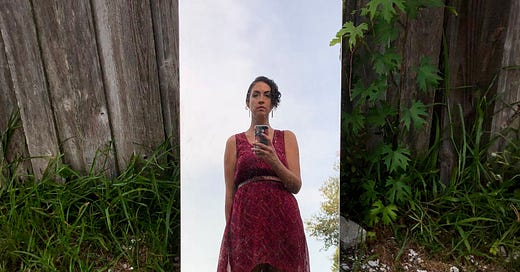My three-month-old daughter recently discovered her hands. She’s completely fascinated by them! In fact, her hands are so interesting that sometimes she gets so caught up in waving them around that she forgets to nap. We’re working on that.
To be honest, I’m pretty fascinated by her tiny hands too. I’m just as amazed by her little feet, her rosy cheeks, her blue eyes, her round belly, and her soft thighs. I think her body is perfect, and I love watching it transform.
The other new parents I know are just as enamored with their babies’ growing bodies. We share reports of weight gain like breaking news alerts. We send videos of our little ones learning to blow bubbles and roll onto their bellies. We text photos of chubby cheeks and thighs to each other along with celebratory emojis. These conversations are remarkably sweet and pure, moments of lightness amid pandemic darkness.
Still, there are times when my sweet dumb brain tries to barge in and ruin the moment. On more than one occasion, I’ve stopped myself from making a derogatory joke about my own chubby thighs—a thought that I wind up keeping to myself. Whereas I applaud my baby’s weight gains, I lament my own. Somewhere along the way, I decided that my body is not worth celebrating.
A few weeks ago, I started reading The Body Is Not an Apology: The Power of Radical Self-Love, by Sonya Renee Taylor. It brought up some big questions for me. At what point did my body change from something I was delighted by to something I was embarrassed of? And is it possible for my daughter to avoid that same fate?
Taylor spoke directly to me when I read this passage:
I have never seen a toddler lament the size of their thighs, the squishiness of their bellies. Children do not arrive here ashamed of their race, gender, age, or disabilities. Babies love their bodies! Each discovery they encounter is freaking awesome. Have you ever seen an infant realize they have feet? Talk about wonder! That is what an unobstructed relationship with our bodies looks like.
My daughter is just beginning to discover her body. She hasn’t yet learned to crawl or walk, or even recognize her own face in a mirror. I am so eager to see her experience these things, to witness her joy in learning what her amazing little body can do.
I also wonder how I can help her hold onto that feeling.
I’ve been critical of my body for decades. I fixate on every imperfection of my face. I get grossed out by my sweaty hands and feet. I feel embarrassed by my large breasts. Whenever I receive a compliment on my looks, I brush it off—surely they’re just trying to make me feel better? I see photos of women who have skinnier legs, shinier hair, better complexions, and wonder why I can’t be like them.
When I was pregnant, those negative feelings started to fade. I loved watching my belly grow, and felt confident in my own skin. I was amazed that my body was growing another body! For the first time in what seemed like forever, I felt beautiful.
Unfortunately, my complaints came rushing back not long after my daughter was born. I was frustrated by how slowly I was healing from my c-section. I grumbled about how much weight I had gained and how hard it would be to shed those pounds. I sighed at the bags under my eyes after yet another sleepless night.
Soon enough, I realized how messed up it was to adore my daughter’s body while begrudging my own. I considered how sad it would be if she was ever as bothered by her self-image as I am by mine. Of course, I can’t control whether or not that will happen. I can’t monitor every comment my daughter will hear about her body, supervise all of the images of other bodies she’ll encounter, or determine how she will ultimately perceive herself. The only thing I can control is the example that I set—and setting a positive example will require some significant changes.
The challenge ahead, as Taylor writes, is to make peace with my body:
I am not simply proposing that you make peace with your body because your body shame is making you miserable. I am proposing you do it because it’s making us miserable too. Your children are sad that they have no photos with you. Your teenager is wondering if they, too, will be obligated to hate their body because they see you hating yours. The bodies you share space with are afraid you are judging them with the same venom they have watched you use to judge yourself. Remember that body shame is as contagious as radical self-love. Making peace with your body is your mighty act of revolution. It is your contribution to a changed planet where we might all live unapologetically in the bodies we have.
That passage hit me like a ton of bricks. I’d previously assumed that my hurtful body image was only mine to bear. Who cares if I don’t love the way my face looks? That’s on me. I didn’t realize that my negative self-image harms others. But it does.
I don’t want to pass on that pain to my daughter. I want to teach her what body acceptance and love looks like. I want to change the way I talk about my body. I want to celebrate myself, too.
Yes, my body is softer after pregnancy, but it’s also stronger from carrying around a baby all day. Yes, my breasts are large, but neither my partner nor breastfeeding child seem to have complaints! Yes, my face bears a scar and wrinkles, but those lines are proof of how Iong I’ve lived. I should know as well as anyone else what a privilege it is to live to see 35. Yes, I can point out plenty of flaws, but I can also identify things I love—my eyes, my smile, my arms, my curls.
The thing that is maybe more fascinating to my daughter than her own hands are her parents’ faces. She loves to stare at me and Billy, taking in as many details as she can. She breaks into a giant smile when I grin at her and is delighted when I make silly expressions. And when I hold her, she’ll reach up to gently touch my face or rest her tiny hand on mine.
She loves me as I am, just like I love her. I could learn a lot from this little one.
xoxo KHG
p.s. What’s your relationship like with your body? Have you made peace with your body, or are you struggling with self-acceptance? I would love to hear your stories. Reply to this email, leave a comment, or send me a message. I’ll feature a variety of responses in Friday’s subscriber-only newsletter.
Sharing is caring
Last week, I asked you all to help spread the word about My Sweet Dumb Brain, and you delivered! I really appreciated the sweet shoutouts on Instagram and Twitter, like this post from Nicole:


I’m on a quest to reach 5,000 newsletter readers and 500 paying subscribers this year. As of this week, I’m at 4,133 readers and 343 paying subscribers. You can help me reach this goal by recommending My Sweet Dumb Brain to a friend or two, purchasing a subscription for yourself or someone else, or sharing this issue on social media. Word of mouth goes a long way in the newsletter world!
As always, thank you for reading this newsletter. Writing it means so much to me.
My Sweet Dumb Brain is written by Katie Hawkins-Gaar. It’s edited by Rebecca Coates, who has had a very tumultuous relationship with her body throughout the years. She’s trying to make peace with her body, too.
This newsletter contains a Bookshop.org affiliate link.






I’ve thought so much about this as I became a parent and now as I have two daughters of my own now. And a son whose body image is no less important honestly. I recommend reading Mothers, Daughters, Body Image by Hillary McBride. It helped walk me through the thoughts around these issues.
This is an important revelation. You don’t have time on this earth not to truly love yourself. See yourself the way your daughter sees you- as a fierce warrior that grew her into existence and brought her into this world. And, always be in the picture with her. 💖